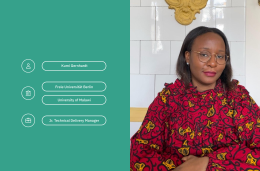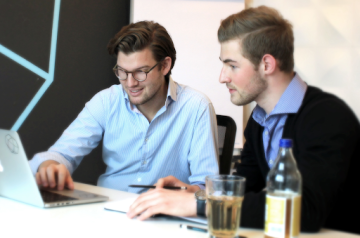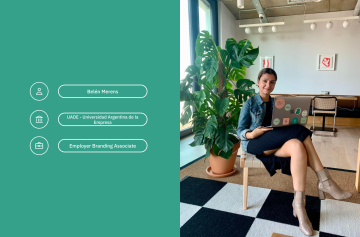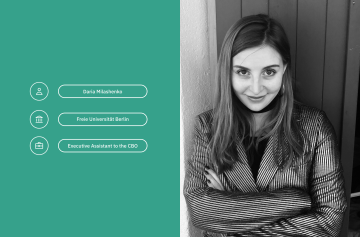
Jr. Technical Delivery Manager Kumi Gernhardt
Kumi’s career has taken many twists and turns—from a career in journalism to a Technical Delivery Manager at N26. Read on to learn how her passion for communication helped her forge her path.
8 min read
If you spend any time at all with Kumi Gernhart, you’ll quickly understand how much she values relationships. Building connection and thinking deeply about others—not only their needs, but how to understand and communicate with them—is her raison d’être. “I feel that there are two ways to get to know people,” she explains. “You can go to a club and have a very nice time, or you can get to know people through their complaints and their suffering. Because then you really know the things they care about, and how to talk to different people in different circumstances.” Kumi studied English, Literature, and Philosophy at Chancellor College at the University of Malawi, and completed her master’s in International Journalism and Communication at the Freie Universität (FU) in Berlin. After starting out in Customer Support, she now works as a Junior Technical Delivery Manager at N26. We sat down with Kumi to talk about her university career and the opportunities it opened up for her. Our interview has been edited and condensed for clarity. Let’s start out by learning a bit about you. Can you talk a bit about your upbringing? My name is Titilayo Kumilonje Gernhardt (née Dzabala)—but I go by Kumi. I’m Malawian and was raised in Blantyre. Most of my family is quite academic—growing up in Malawi, if you really want to make it, education is the way. My mother’s a pharmacist, my father is an engineer, and also I was raised by my grandmother, who was working in the field of women’s rights. But while most of my family is very scientific, I always loved stories and helping people, so it very much seemed like my path in life was toward the humanities rather than the sciences.That’s so interesting. What did you decide to major in? I studied English, Literature, and Philosophy at Chancellor College. I’m someone who just loves to absorb information. After graduating, I applied to the Malawi State Broadcasting Center, and was hired as a reporter, editor, and producer. I mainly worked in radio, but also in TV and a bit online. Then, I did some courses with Deutsche Welle in Journalism to figure out what I wanted to do. At this point, I felt that I understood journalism and wanted to do something more. So I began applying for some master’s programs. And I got accepted to the masters program for International Journalism and Global Communications—a dual master’s at Freie University that took place in both St. Petersburg and Berlin.Let’s focus on your undergrad experience for a moment. Can you talk about stories that really impacted you?To be honest with you, it’s the friendships that stuck with me the most. Outside of that, I took a class on logic and fallacies. We had discussions about the history of Malawi, the politics of Malawi, and so much more. My undergrad taught me how to think, how to argue, how to ask the right questions, how to provide a well-reasoned argument. It really taught me a kind of critical thinking that I’ve needed throughout my life. Today, if someone asks me a question about why I’m saying what I’m saying, I’m able to see it not as a threat but as a challenge to do more. This idea of rational thinking and developing coherent arguments—is that something that drove you toward journalism?
Yes. Honestly, I thought if the news and media stories were provided in this way and tried to be as balanced as possible, then it would make a difference. Lawyers have to pass a bar, doctors have to pass their medical exams, yet you don’t really have this with journalism, and I think that’s a shame. It’s so important, because information dissemination, the information that people get and the decisions they make based on that information, changes the world. There’s a real ethics missing in journalism. And I really believe that in order to change something, you have to understand what’s going on. So I went to school for journalism to do that, with the goal of giving people two-sided, ethical, and fair information. Those were my youthful dreams, anyway! Let’s move on to your graduate degree. You went to the Freie Universität—what was your experience there like? Because the program took place in two countries, I arrived in St. Petersburg first and spent the winter there. It was the coldest place I’d ever been, and the first time I’d seen snow! I tried to not have too many preconceptions, which was good, because it helped me be more open. One thing I remember thinking was that there was no conversation about anything going on in the southern hemisphere. It was all western journalism—not just no African journalism, but also no Asian journalism, no South American journalism, and so on. When I mentioned this to my professor, he encouraged me to gather some information on this topic and present it to our class. Because I feel that it’s not enough to say, “You’re not doing this.” It’s better to say, “Here’s what I see is missing, and here’s what I want to do about it.” Because then you’re progressing, rather than just criticizing. It must have been eye-opening to immerse yourself in another culture like that!The language was different, the food was different, even the alphabet was different. But I made some very good friends there. My Russian colleagues were so generous, took me everywhere I needed to go, and really took care of me. When I arrived in Berlin for my second semester, I found Germans to be much more self-sufficient and individualistic. That said, I had an easier time at FU. My program was very diverse—we had people from all different backgrounds and cultures. Also, the school has such a rich history—I’m so honored and proud to have gone there. I did my thesis there as well: a comparison of the British media’s coverage of the migrant crisis in Europe and the migrant crisis in South Africa at the time that nobody was talking about. Fasticating—that sounds like a great topic. I want to talk a little bit about your transition to customer support. Can you discuss what led you to your first job at N26?When I finished uni, I didn’t intend to stay in Germany. But when you graduate from a German university, you can stay here for a year and a half and look for a job. So, I decided I would stay here for six months, get a random job to pay my bills, and then go back home. I thought, “Okay, I’ll get a job in customer service, no big deal.” Well, it is a big deal—they work very hard! But I really wanted to learn about people, and Customer Support was the best way to do that. Then, my plans changed. I met a guy, and we got married! So, I decided to stay in Berlin, and eventually got the job at N26. I was in Customer Support for three months, after which I joined a special task force for account takeovers. This was my first move toward tech because it was about understanding what fraudsters do to manipulate our technology to create accounts. I really enjoyed this, but eventually I wanted a new challenge. And what was that new challenge?I decided to do a bootcamp and become a web developer! I used my development budget and got my certification. I love coding and have so many ideas for personal projects. But I also love people and felt that I had gathered a lot of experience helping them. I was worried that by becoming a developer, I would be wasting years of experience. Then, by a stroke of luck, the position for a Junior Technical Delivery Manager opened up. I got the position, and here I am! Every day, I learn more about technology, but also working with different stakeholders. It’s both the technical side and the communication side—I really like that balance. Can you talk a bit more about your role and what you like about your job?
Basically, I’m focused on IT solutions in line with our compliance and regulatory requirements. Right now, we’re looking at identity and access management, making sure that we have all the technology we need, that the processes are aligned with our regulatory obligations, compliance obligations, and so on.I have such a great team lead who is so supportive and always challenges me to do more. You see, I’m not afraid of a challenge and I’m not afraid of problems, as long as we’re moving toward a solution. I’m someone who wants to hear the bad news and then I want to figure out how to get out of it. Also, as a Technical Delivery Manager, your stakeholders are quite diverse. You have Legal, Compliance, and web developers, who all have different things that they care about. It’s a bit like being on a tightrope. But mentally, I think it’s very healthy—and I’m never bored!Lastly, can you tell me some lessons from university that you apply to your work?The first lesson I learned is respect for a diverse team. University taught me how to communicate with different people—I don’t get offended easily, and I’m quick to apologize if I offend somebody. I’m also able to explain my point of view and hear the point of view of others in a way that feels safe. I tell my colleagues, “I am happiest communicating this way. Can you tell me how to best communicate with you so that we can get the job done?” I believe in creating a very positive work environment and I really try to understand people I’m working with: ask them questions about themselves, get to know them, and understand how best to help them get the job done. I guess I’m really still on this mission to help people and make them feel heard.
Find similar stories
BY N26Love your bank
Related Post
These might also interest youINSIDEN26Reflecting on 9 years at N26N26 Chief Growth Officer reflects on his 9-year journey at Europe’s leading digital bank
10 min read
INSIDEN26Employer Branding Associate Bel Merens on uni, travel, and living your dreamsTeam spotlight: Bel shares how she made her dream—moving to Europe to work for a popular FinTech—a reality.
9 min read
INSIDEN26Team spotlight: Daria Milashenko, Executive Assistant to the CBOWhen Daria Milashenko, Executive Assistant to the CBO at N26, visited Berlin at 15, it was love at first sight.
9 min read


